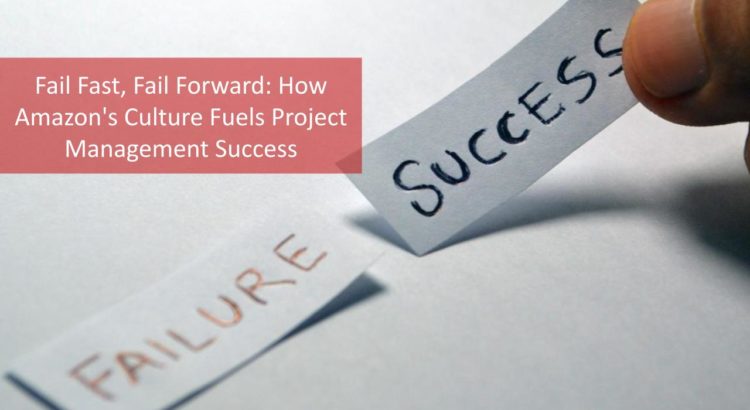In today’s dynamic business environment, the ability to adapt and learn from mistakes is essential for any organization. Amazon, the e-commerce behemoth, has famously embraced a “Fail Fast” culture, encouraging experimentation and calculated risk-taking to drive innovation. This blog post will explore how Amazon’s Fail Fast approach connects to effective project management, using key concepts and techniques from the Project Management Professional (PMP)® framework.
Understanding the “Fail Fast” Mentality
At its core, Fail Fast emphasizes rapid prototyping, testing, and iterating based on real-world feedback. This means embracing small failures as learning opportunities, rather than viewing them as setbacks. By failing quickly and cheaply, teams can identify flaws early, pivot strategies, and ultimately deliver better results.
Amazon’s “Fail Fast” culture is rooted in the philosophy of embracing failure as a stepping stone to innovation. This approach encourages quick experimentation, rapid iteration, and learning from failures to drive success in a dynamic business environment. Amazon’s strategy involves launching pilot projects, assessing their performance, and promptly pivoting or discontinuing based on the results. This culture of risk-taking and learning aligns seamlessly with effective project management practices, especially those emphasized in PMP certification.
Examples of Amazon’s “Fail Fast” in Action
1. Amazon Prime Air Drone Delivery: In 2013, Amazon announced its ambitious drone delivery service, Prime Air. While the initial vision met logistical and regulatory hurdles, the project pushed the boundaries of delivery technology and gathered valuable data. This “fail” paved the way for ongoing drone-based initiatives like autonomous parcel delivery in select areas.
2. Amazon Fire Phone: Launched in 2014, the Fire Phone aimed to compete with high-end smartphones but failed to gain traction due to a steep price tag and limited app compatibility. However, the experiment provided valuable insights into hardware design and consumer preferences, informing future Amazon devices like the Fire tablet and Echo smart speaker.
3. AmazonFresh Grocery Delivery: This service initially faced operational challenges and high subscription costs, leading to adjustments in pricing and logistical models. By iterating quickly based on user feedback and pilot program data, AmazonFresh ultimately became a profitable grocery delivery option in several major cities.
4. Amazon Dash Button: These single-use buttons connected to Wi-Fi and allowed users to reorder everyday items with a single press. While ultimately discontinued due to limited adoption, the Dash Button concept provided valuable data on user behavior and the potential for smart home integrations, influencing future Amazon endeavors like voice-activated ordering through Alexa.
5. Amazon Kindle Fire: With its competitive price and focus on content consumption, the Fire tablet carved out a niche in the market, despite initial concerns about its limited functionality. The success of the Fire tablet validated Amazon’s focus on affordability and accessibility, informing its strategy for various product lines.
Beyond Success Stories
Remember, not every “Fail Fast” experiment translates into immediate success. The key is to learn from both successes and failures, adapt quickly, and refine strategies based on real-world data. Amazon’s culture encourages taking calculated risks and accepting failures as valuable learning opportunities, ultimately leading to the development of profitable products and services.
Connecting Fail Fast to PMP® Principles
The PMP® framework, developed by the Project Management Institute (PMI)®, provides a comprehensive set of guidelines for managing projects across diverse industries. Several key PMP® concepts perfectly align with the Fail Fast philosophy:
Start your PMP journey today by enrolling in Master of Project Academy’s PMP courses:
- Iterative and Incremental Development: This approach breaks down projects into smaller, manageable chunks, allowing for continuous feedback and adjustments throughout the lifecycle. This aligns perfectly with the rapid testing and iteration advocated by Fail Fast.
- Risk Management: Proactively identifying and mitigating potential risks is crucial for any project. Fail Fast encourages calculated risk-taking, but within a framework that minimizes negative impacts.
- Stakeholder Engagement: Keeping stakeholders informed and involved throughout the project is essential for building trust and securing buy-in. Fail Fast promotes transparency and open communication, even when things don’t go as planned.
PMP® Tools and Techniques for Fail Fast Execution
PMP® offers a wealth of tools and techniques that can be applied within a Fail Fast culture:
- Minimum Viable Product (MVP): Creating a basic, functional version of a product or service allows for early testing and feedback, crucial for rapid iteration.
- Sprint Planning and Retrospectives: Agile project management methodologies, endorsed by PMP®, promote short iterative cycles (sprints) with built-in feedback loops. This aligns perfectly with the Fail Fast ethos.
- Lessons Learned Register: Documenting and sharing learnings from both successes and failures is essential for continuous improvement. This resonates with the Fail Fast emphasis on turning mistakes into valuable experiences.
Read our article about the Key Project Management Tool; Project Management Plan
Benefits of Combining Fail Fast and PMP®
By embracing Fail Fast within a PMP®-guided framework, organizations can reap significant benefits:
- Enhanced Innovation: Experimentation and calculated risk-taking foster a culture of creativity and problem-solving.
- Increased Agility: Quick adaptation to changing market conditions and customer needs leads to a competitive edge.
- Improved Efficiency: Early identification and correction of errors saves time and resources in the long run.
- Boosted Team Morale: A culture that embraces learning from mistakes fosters a more engaged and empowered workforce.
Conclusion
Amazon’s Fail Fast culture serves as a powerful reminder that embracing calculated risks and learning from mistakes are essential for project success. By applying PMP® principles and techniques within a Fail Fast framework, organizations can foster a culture of innovation, agility, and continuous improvement, ultimately leading to more successful projects and a competitive advantage.
- Check out our Project Plan Example example blog article
- Our exclusive “Sandbox,” membership provides PMP® principles and techniques with real-life examples
